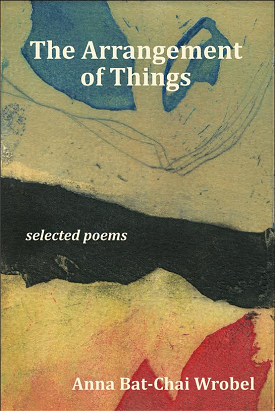The Arrangement of Things
The Arrangement of Things, by Anna Bat-Chai Wrobel.
Moon Pie Press, 2018,
89 pages, paper, $15,
ISBN: 978-1-7323624-1-3
If someone asked, I might say that Anna Bat-Chai Wrobel is a political poet, or maybe a witness poet. But then again, I might not say either, afraid I’d unfairly stereotype her for prospective readers of The Arrangement of Things. Still, if you’ve heard of Auschwitz, Kristallnacht, Anna Akhmatova, Yishuv, or Brooklyn, or if you’ve read a novel set in Germany titled “Every Man Dies Alone,” I think she’s your kind of poet. Maybe I’d say she’s a social justice poet: historian, teacher, daughter of a Polish Jew who fought with the Soviet Army during WWII, descendent of family members on both sides who were murdered at Treblinka. Certainly she’s a Jewish poet — a product of the diaspora, born in Brooklyn and raised in the Bronx, who once described herself as a “nomad of the boroughs.”
Knowing her history makes me particularly enjoy her poem “Sweeping the Screen Porch in December which concludes:
good news
bad news
life and death in the balance …
I sweep dry leaves and old seed
from the cold screen porch
not knowing what else to do.
I’ve pondered these lines after reading other poems in this volume, sensing in them a contentment the poet has not always experienced. In “Phone Call” she tells about her father’s friend, “a man /not dead at Auschwitz” who passed away two days ago:
“I came to America to kill cockroaches,” he said.
“This is what life is.”
But better than killing men and being
called cockroach, rat and virus.
The poem details his struggle to make it in America (“Telling factory owner in the Bronx to go to hell”). She says, “He is our living memory.”
But being a Jewish poet is what makes Wrobel, in the final analysis, a human poet, and the kind of political poet who wouldn’t want to build a wall at the border. Recently I heard her read “Mayan Girl (one)” subtitled “(Brooklyn subway /destination Port Authority).” She instantly feels a bond with this child:
her father mine
her full cheeks mine
her lost-between languages
inner speech mine
In the final stanza her voice seems defiant:
bless the small
child of migration —
may New York City not crush you
may you grow beyond
the servitude assigned
to your parents
She continues this expression of egalitarianism in the poem with my favorite title, “Of Greek Omelettes and Jewish Rye.” This time she’s in Stage Door Deli and notices “Mayan and Aztec faces abounding” as the help reflects another diaspora:
This is “el Norte” and for decades now
the diner world has absorbed many
thousands of “Indians” pushed from
their lands, barely visible in ours
For this reader, these poems evoke both Whitman and Martín Espada, but Wrobel is also the type of person who recognizes those afflicted with the mundane bad luck of daily life. Her poem “That Dollar” is about “the crusty girl /or skinny man” seen regularly standing at intersections with signs that remind us that anything helps. I sense she’s still thinking of these lost souls in “This Close,” where she rejoices at being in a pastoral setting “while the masters of emptiness /swim secure in gold-plated / Nothing.”
Again, I want to avoid stereotyping this poet who must bear the “dilemma of memory.” There’s a poem about falling in love (“My Cagney”) and one titled “Senior Discount,” which shows social justice poetry can be funny (“I’ll be damned if I’ll hide my age / and forgo the ten percent”). I laughed again at “On Pruning a Library,” when she asks, “So what should I do with the Freud?” She also has a funny poem about aesthetics titled “Cheap Seats,” which is where, she affirms, we can find “real poetry.”
Perhaps the thematic key to The Arrangement of Things is kindness and the world’s desperate need for it (the book’s title comes from the poem “a student’s gift.” In “Commonwealth,” she writes:
There is the peace
that settles in the one
who saves a life as
the Talmud suggests
the “world entire” may
be joined to a deed.
One might say that the arrangement of things in this book is itself an act of kindness. This reviewer would also make the bold claim that readers of it might be reminded of their own capacity for kindness. Brecht asked if there would be singing “in the dark times” and concluded “Yes, there will be singing. /About the dark times.” Many of us in America think dark times are upon us now. Those who feel the need for singing might want to read this book.
— Kevin Sweeney


